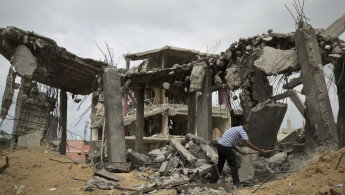Rebuilding Gaza 'is in the hands of God'
Mohammad Abu Shawish, a resident of Nuseirat refugee camp in Gaza, saw his home crumble to dust when an Israeli missile smashed into the building during a recent airstrike.
"In a flash, you see your home destroyed in front of you," he said. "I don't know how many years it will be before I can put a roof over our heads and shelter my family."
Looking to get his life back on track, he is now struggling to find the necessary materials to rebuild even one room for his family to live in.
Obtaining building permits is a difficult and cumbersome task. Permission must be sought from companies overseeing the reconstruction of Gaza, or from the United Nations Relief and Works Agency [UNRWA], which is managing the project.
"I won't stand around with my arms crossed," he said. "I won't live in a caravan or a school. It's my right that I get my house back. I had a whole house and now I am trying to get my hands on what I can to build just a single room for me and my family of eight. I don't know why the world is waiting while my kids have no clothes and are not getting an education. Rebuilding is in the hands of God."
The reference to the almighty is an Arabic saying that was coined by satirist Akram al-Sourani, which holds true for many Gazans.
Rebuilding is frequently subject to delays and there are no signs that authorities, or companies in charge of reconstruction, are making any progress in getting construction back on track.
Trading woes
Cement trader Hilail al-Shamali works with 11 other distributors to supply the necessary materials to those looking to rebuild their homes in Gaza. Shamali has obtained 200 tons of cement to distribute across the coastal strip.
"There are CCTV cameras everywhere," said Shamali. "I don't know who is watching them or where the images are going."
Since the supplies came to him 15 days ago, foreign observers have come to his company every two days to watch over proceedings, while others come to inspect the number of bags of cement in his stores.
| Rebuilding is frequently subject to delays and there are no signs that authorities... are making any progress. |
As with many others in the blockaded territory, Shamali lost his home in an Israeli attacks, and paid more than 100,000 shekels ($26,600) for the cement, which has sat in his company's storerooms since the purchase.
"I paid for the cement but I can't take a single bag and use it to rebuild my house or sell it to anyone," he told al-Araby. "I paid for it and I don't have the right to use it."
Supply problems
Shamali said that UNRWA officials told him they would send him a list with the names of beneficiaries he could distribute the cement to, and the exact price for a ton of cement. The agency also promised that it would bring larger amounts of building materials into Gaza in the coming weeks.
"The building materials that have come into the Gaza Strip since UN Secretary General Ban Ki-moon visited are still sitting in warehouses," said economist Mahir al-Tabba. "But this amount is still only 20 percent of the supplies Gaza currently needs.
"If you bring in more than 400 trucks of steel, cement and gravel every day then we could say that would take between three and five years to rebuild Gaza. But because of useless international controls on bringing in building materials into Gaza, it is more likely to take more than 20 years."
Although the situation remains dire for the thousands of homeless people, experts say that reconstruction projects should provide a number of jobs for Gazans, temporarily abating the unemployment crisis in the coastal strip.
Rebuilding will require close to 100,000 labourers, analysts say, and this should help reinvigorate the local market. Recent comments made by Palestinian unity government officials have reinforced this notion, and many Gaza residents are preparing themselves and their tools for the rebuilding projects, whenever they get off the ground.
This article is an edited translation from our Arabic edition.





 Follow the Middle East's top stories in English at The New Arab on Google News
Follow the Middle East's top stories in English at The New Arab on Google News


